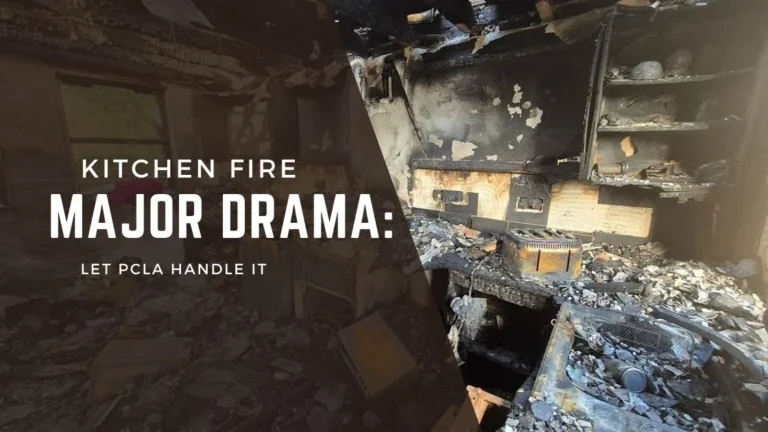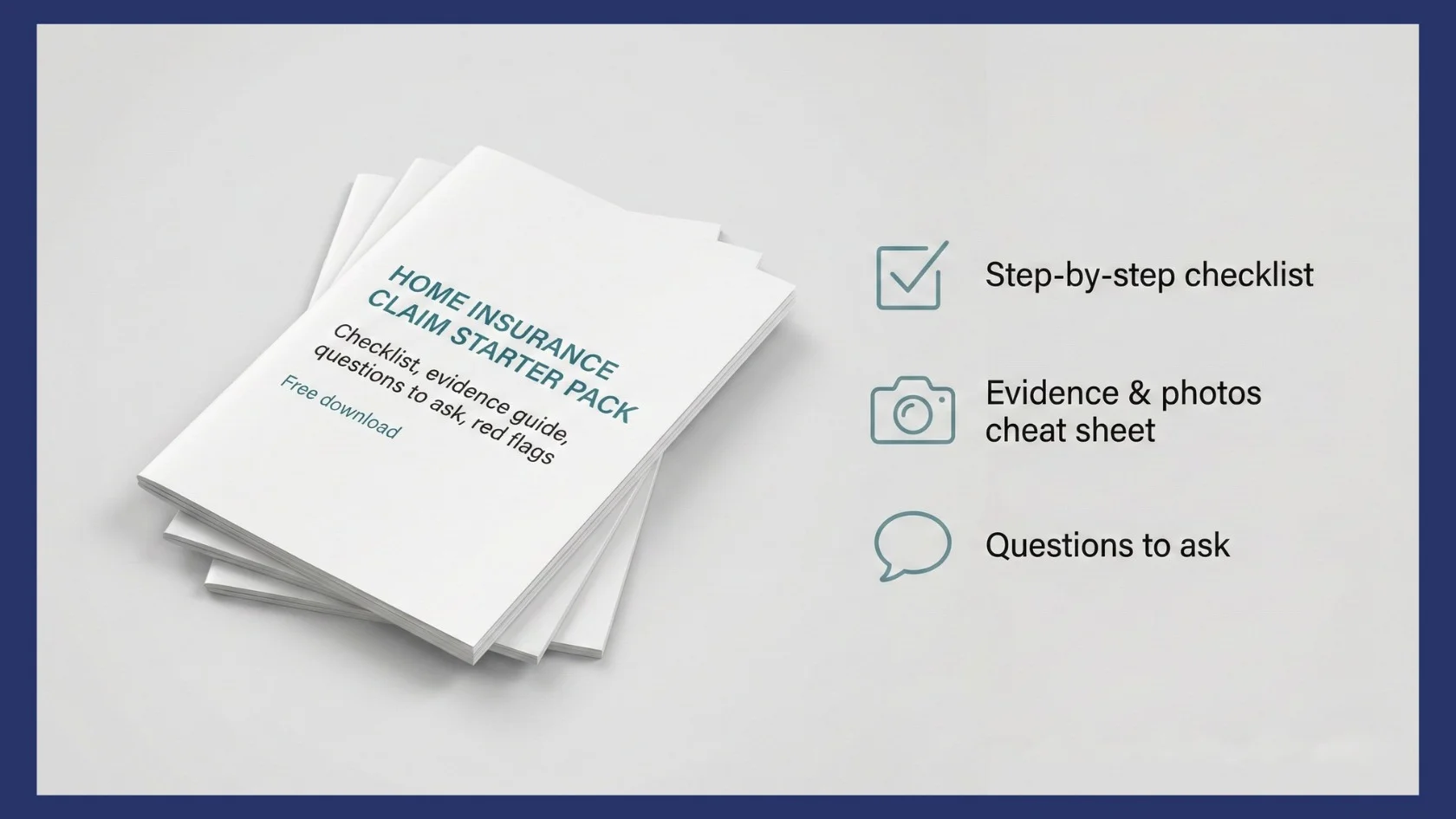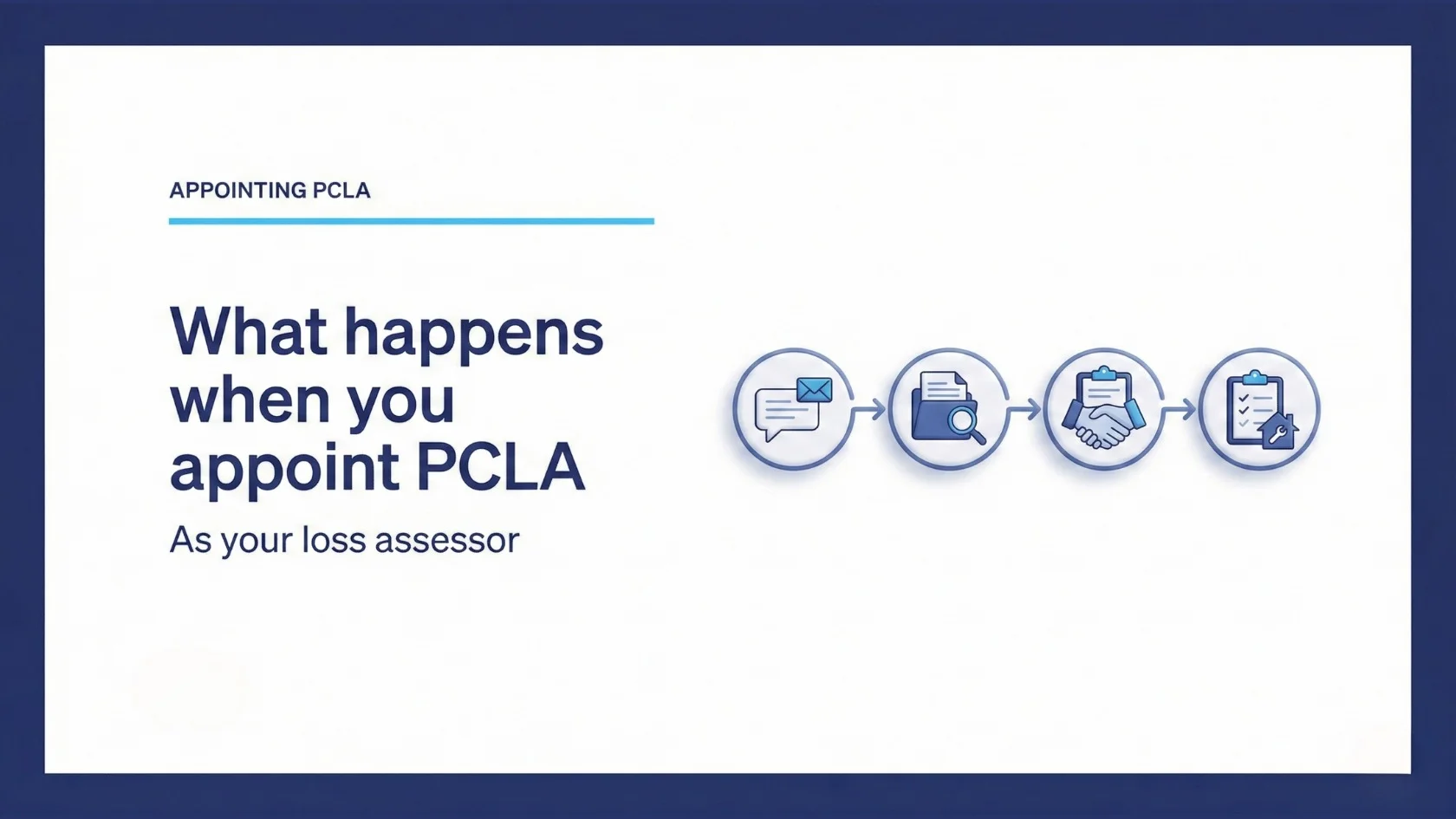A small fire in the kitchen can quickly escalate into a major headache, leaving behind not only physical damage but also a complicated insurance claims process. Dealing with the aftermath can be overwhelming for homeowners. Fortunately, Professional Claims Loss Assessors (PCLA) can guide you through the complexities, ensuring you receive a fair settlement and helping you restore your home efficiently.
A small fire in the kitchen is something most people never expect, but it happens more often than we might think. One misplaced towel, a forgotten pan on the hob, or a spark from a faulty appliance is all it takes. And while you might act quickly, dousing the flames before they spread, the headaches that follow can feel overwhelming.
For many homeowners, the hardest part is not extinguishing the fire but dealing with the aftermath, especially when it comes to insurance claims.
In Northern Ireland, the insurance process can be particularly challenging to navigate. Policies are often filled with complex clauses, exclusions, and technical jargon, which can leave homeowners confused and stressed.
The Financial Conduct Authority (FCA) recently warned insurers about the importance of supporting struggling customers effectively, highlighting ongoing issues in the insurance sector where consumers face difficulties understanding their policies and accessing fair support (FCA Guidance).
That’s where Property Claims Loss Assessors (PCLA) come in. Based in Belfast, PCLA specialises in guiding homeowners through the claims process, ensuring they receive their full entitlement under the terms of their insurance policy. This blog explores why even a small kitchen fire can create complications and how PCLA can be the ally you need to successfully navigate an insurance claim.
The Challenges of Kitchen Fires and Fire Damage
The Far-Reaching Impact of Fire Damage
Fire damage isn’t just about the visible flames. Most of the lasting damage from a kitchen fire comes from smoke and water. Smoke infiltrates every nook and cranny, leaving odours that are hard to remove and staining surfaces like walls, ceilings, and furniture. Then there’s water damage, which often results from extinguishing the flames, causing swelling in wood, rusting in metal, and providing ideal conditions for mould growth.
Homeowners are often shocked at the extent of damage a small fire can cause, even when it is quickly contained. Insurers, however, tend to scrutinise every detail. They require extensive evidence to determine the cause, impact, and necessary repairs, which can lead to delays, disputes, and added stress.
At PCLA, we frequently deal with these types of claims. A recent claim we handled in Lurgan involved a chip pan fire, which caused significant damage to kitchen units and smoke damage throughout the property, affecting soft furnishings and other contents. According to national statistics, cooking appliances were responsible for 44% of accidental dwelling fires in England for the year ending March 2023 (UK Government Statistics).
Complexities in Insurance Policies
Insurance policies are rarely straightforward, particularly when it comes to fire damage. Policies often contain clauses that can be difficult to interpret without a professional background. For example, clauses related to ‘contributory negligence’ or ‘wear and tear’ are commonly misunderstood, often leading to disputes during the claims process.
The FCA provides guidance on understanding these clauses to help consumers navigate challenges effectively. Homeowners frequently encounter terms like “smoke damage,” “accidental fire,” and “policy exclusions,” which may impact their claims if not fully understood. If the insurer believes that a fire could have been prevented by taking reasonable precautions, they may limit or deny coverage. Lack of clear documentation or missteps in the claim process can also result in reduced compensation or outright denials.
How PCLA Helps Homeowners Through the Fire Claim Process
Thorough Assessment and Documentation
When you contact PCLA after a kitchen fire, our first priority is to provide a thorough assessment of the damage. Insurance claims hinge on solid evidence, and we ensure everything is meticulously documented, from photos and videos to written descriptions. This documentation covers visible fire damage, as well as smoke, soot, and water damage that may not be immediately obvious.
With a detailed assessment, we can establish a strong foundation for your claim, reducing the chances of disputes with insurers. Our goal is to present a clear and compelling case to secure your full entitlement.
Deciphering Insurance Policies
Understanding your insurance policy can be one of the most challenging parts of a fire damage claim. These documents are complex, and small details can significantly affect your claim outcome. Some policies only cover direct fire damage, while others may also include provisions for smoke and water damage.
PCLA works closely with homeowners to break down their policy details, making it clear what’s covered and what might be excluded. This helps you prepare for what to expect from your claim and prevents unpleasant surprises when dealing with your insurer.
Handling Insurer Communication
Dealing with an insurance company after a fire can be overwhelming. Insurers often require specific documents, ask for clarifications, or request additional information. For most homeowners, these interactions add to the stress during an already difficult time.
PCLA takes on this responsibility, handling all correspondence and negotiations with your insurer. Our expertise ensures effective communication, moving your claim forward smoothly while representing your best interests. This approach means you can focus on getting your life back on track while we handle the complexities of your claim.
Common Mistakes in Fire Damage Claims
Lack of Proper Documentation
One of the most common mistakes is insufficient documentation. Many homeowners believe the damage is self-evident, but insurers require detailed evidence to assess a claim properly. The Association of British Insurers (ABI) recommends documenting all fire damage thoroughly, including taking photographs and maintaining a detailed inventory of affected items (ABI Guide).
Failing to document the full extent of the damage or not keeping a record of interactions with emergency services can lead to reduced payouts. PCLA guides clients through this process to ensure every detail is captured, supporting a more accurate evaluation of the damage.
Misinterpreting Policy Coverage
Another frequent issue is misunderstanding the policy itself. Insurance contracts can be challenging to interpret, especially concerning fire damage clauses. Homeowners might assume certain aspects are covered, only to find exclusions or limits that affect their claim.
PCLA helps clients understand exactly what their policy covers. With this information, homeowners can make informed decisions and approach the claims process with realistic expectations.
Premature Repairs
After a fire, homeowners understandably want to restore their property quickly. However, making repairs before the insurer assesses the damage can work against you. Insurers may refuse to pay for undocumented repairs or argue that some repairs weren’t necessary.
PCLA advises clients to wait until the insurer has completed their assessment before beginning significant repairs. This ensures that the full extent of the damage is recognised, helping secure the highest possible settlement for necessary restorations.
The Advantage of Working with PCLA for Fire Damage Claims
Fair Valuation of Damages
One of the key roles of PCLA is to ensure that the valuation of damages is fair and sufficient for complete restoration. Insurance companies often rely on their adjusters, who may undervalue the cost of repairs. According to the Financial Times, undervaluation of claims by insurers’ adjusters is a common issue that leaves many policyholders frustrated and out of pocket (Financial Times).
At PCLA, we provide independent assessments that reflect the true cost of repairing fire damage, helping ensure you do not end up paying out of pocket for what should be covered by insurance. By using reliable, independent valuations, we help clients receive a fair settlement without the stress of dealing with undervaluation by adjusters.
Expertise in Negotiation
Disputes between insurers and homeowners are not uncommon, particularly with complex fire claims. PCLA has extensive experience dealing with these disputes, negotiating on behalf of homeowners to achieve a fair outcome. Our familiarity with insurance industry practices allows us to anticipate potential issues and advocate effectively for your entitlements.
By representing your interests, we work to minimise delays and disputes, aiming for the best possible settlement. With our support, you’re less likely to face unnecessary roadblocks that could prolong the process or impact your payout.
Steps to Take After a Kitchen Fire
Review Your Insurance Policy
It’s wise to understand your insurance policy details before needing to file a claim. Look for coverage information related to fire, smoke, and water damage. Knowing these details can help you avoid costly misunderstandings during the claims process.
Maintain Organised Records
Maintaining an organised file with all documents related to your home and insurance policy is crucial. This should include receipts for major appliances, records of renovations, and your insurance policy. The ABI recommends keeping detailed records of your home’s contents and any improvements to support insurance claims effectively (ABI Guide). In the event of a fire, these documents will support a smooth and successful claim.
Engage a Loss Assessor Early
After a fire, engaging a loss assessor like PCLA can make all the difference. The sooner you have expert guidance, the better your chances of a smooth, fair resolution. Loss assessors understand the claims process from start to finish and can help you avoid mistakes that lead to delays or disputes.
Conclusion
A small kitchen fire can quickly escalate into a complicated ordeal, especially when it comes to insurance claims. As we’ve discussed, fire damage claims often involve more than just repairing obvious damage. Complexities around policy coverage, documentation, and insurer communication can make the process overwhelming.
At PCLA, our role is to simplify this process for homeowners throughout Northern Ireland. We provide expert support, from detailed assessments and policy guidance to handling all interactions with insurers. With our help, you can navigate fire damage claims confidently, knowing your interests are being represented every step of the way.
If you’re dealing with the aftermath of a kitchen fire, don’t face the insurance process alone. Contact Property Claims Loss Assessors (PCLA) for professional advice and assistance. With over three decades of experience, we’re here to protect your rights and ensure you receive a fair settlement. Let PCLA be your trust advocate in restoring your home and achieving piece of mind.



